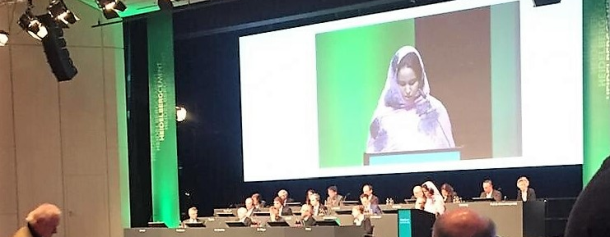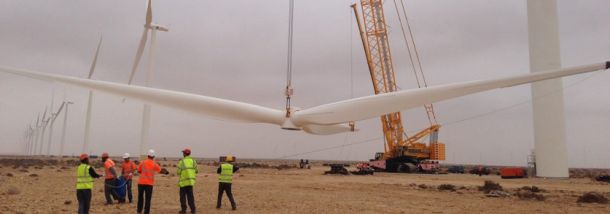
The cement sales of Heidelberg Materials in occupied Western Sahara could have increased by 150% in two years.
Photo above: Construction workers laying the cement foundation of a new control tower, in 2021, as part of the new port in El Aaiún, occupied Western Sahara. The purpose of the port is for the Moroccan state owned company OCP to export phosphate rock from the territory - in violation of international law. It is not known to WSRW who supplied the cement.
The German cement giant Heidelberg Materials AG has experienced a massive growth in its cement production in occupied Western Sahara.
This is clear from a session of questions and answers that took place at the company's Annual General Meeting (AGM) in Heidelberg on 11 May 2023.
The company stated at the meeting that the production in the occupied territory in 2022 was a record total of 896,000 tons. To compare, in 2021 the company declared at the AGM that the volume was 525,000 tonnes for 2020.
No information appeared in the discussion as to where the cement was being used during 2022. For 2020, the company had stated that two-thirds of the cement was used in Western Sahara and the rest was exported to Morocco.
During last year's AGM, in 2022, the company told that nothing was being exported, but that all was used in Western Sahara. Supposing that this is true for the entirety of 2022, it means that the company's cement sales for local usage in Western Sahara increased from 350,000 tons in 2020 to 896,000 tons in 2022 - a 150 percent increase.
It is likely that Heidelberg Materials has been highly profiting of the Moroccan government's construction of a new port, a work that began in 2021. Heidelberg's local subsidiary itself states on its website that it is providing cement to the new port [or download]. The purpose of the new port - and an associated fertilizer plant - is for the Moroccan state phosphate company to export phosphate rock and fertilizer products from the territory that it illegally holds under occupation. That trade takes place in violation of international law.
The Heidelberg Materials' clarifications during the AGM came as responses to a series of questions from the German NGO Dachverband der kritischen Aktionärinnen und Aktionäre. The intervention of the association, and the answers from the company, can be downloaded here (WSRW's translation from German). See press release by the NGO here.
No clarifications were given to a what its role is in contributing in building a so-called "interconnexion électrique" - which is mentioned on the company website. The officials promised to “clarify this bilaterally afterwards”.
The company stated also, explicitly, that it does not wish to relate to the status of the territory: “As a private company, HeidelbergMaterials does not take a position on the status of individual territories under international law", the company CEO Dominik von Achten stated.
“We find such a position astonishing”, comments Tim Sauer of Western Sahara Resource Watch.
“We struggle to believe that this is indeed the Heidelberg Materials' position in any other place in the world where it operates. A first step for any company operation, would be to have an opinion about which country or territory it is in. And then, ask permission from the right entity. Heidelberg Materials explicitly states that it never follows that logic. Based on their statement, it makes one wonder if it has bothered to take into account any legal framework in any of the countries where it is operating”, Sauer stated.
The territory is “separate and distinct” from Morocco, according to now 6 rulings in the European Court of Justice. The Saharawi people asks is that the company respects the people's right to self-determination. This is what Heidelberg Materials chose to not relate to. Morocco has illegally occupied the larger part of the territory since the 1970s.
Heidelberg Materials AG has previously been named HeidelbergCement AG. The 2023 AGM approved to change the name of the group.
Since you're here....
WSRW’s work is being read and used more than ever. We work totally independently and to a large extent voluntarily. Our work takes time, dedication and diligence. But we do it because we believe it matters – and we hope you do too. We look for more monthly donors to support our work. If you'd like to contribute to our work – 3€, 5€, 8€ monthly… what you can spare – the future of WSRW would be much more secure. You can set up a monthly donation to WSRW quickly here.
'We deserve an answer' from HeidelbergCement
When requesting answers on human rights from HeidelbergCement with regard to its operations in occupied Western Sahara, Saharawi Khadja Bedati was told that the company "deliberately makes social sponsoring of various sports clubs".
UK company building wind park in occupied Western Sahara
Morocco and Siemens press on with their plans to generate energy in the human rights black-spot that is Western Sahara: the first controversial wind farm near Boujdour is expected to be operational in December 2018, built by a UK company.
New controversial energy infrastructure to be built in Western Sahara
The Moroccan government has opened for a relatively large tender in Dakhla.
Report: Moroccan green energy used for plunder
At COP22, beware of what you read about Morocco’s renewable energy efforts. An increasing part of the projects take place in the occupied territory of Western Sahara and is used for mineral plunder, new WSRW report documents.



